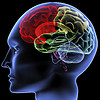
Session Overview
 |
How does the physical brain create the mind? This session explores how the brain's structure relates to specific mental functions. The cases of some famous patients, such as Phineas Gage and Patient H.M., demonstrate key points about the brain basis of personality and memory. Keywords: brain structure, neurons, location of mental functions, hemispheres, Phineas Gage, Paul Broca, corpus callosum, split brain, patient H. M. Image: Public domain (NIH) |
Session Activities
Readings
Read the following before watching the lecture video.
- [Sacks] Chapter 15 "Reminiscence" (pp. 132-149)
- Begin one of these chapters in your chosen textbook:
Lecture Videos
View Full Video
- Lecture 3: Brain I (00:54:19)
View by Chapter
- The Mind is What the Brain Does (00:06:27)
- Brain Overview: Historical Viewpoints, Neurons, Gross Anatomy (00:13:16)
Brain Overview: Historical Viewpoints, Neurons, Gross Anatomy
> Download from iTunes U (MP4 - 117MB)
> Download from Internet Archive (MP4 - 117MB)
- Localization of Mental Functions (00:16:44)
- Hemispheric Specialization (00:17:52)
Video Resources
Check Yourself
What are the two types of autonomic nervous system?
› View/hide answer
Sympathetic nervous system, Parasympathetc nervous system
Further Study
These optional resources are provided for students that wish to explore this topic more fully.
| TYPE | CONTENT | CONTEXT |
|---|---|---|
| Web resource | Comparative Mammalian Brain Collections (aka "Brain Museum") | Resources on brain anatomy for a wide range of mammals |
| Web resource | The Human Brain. Discovering Psychology. WGBH Educational Foundation, 2001. | Summary exploration of the human brain, in animated Flash and non-Flash versions |
| Supplemental reading | Wang, S., and S. Aamodt. Welcome to Your Brain: Why You Lose Your Car Keys but Never Forget How to Drive and Other Puzzles of Everyday Life. Bloomsbury, 2008. ISBN:9781596912830. | An overview of current understanding about the human brain, recommended by the TAs |
| Textbook supplement | Study materials for Chapter 3, "The Biology of Mind and Behavior," in Study Site for Psychology in Context, 3/e (Pearson Education, 2007) | Practice test questions, flashcards, and media for a related textbook by Kosslyn & Rosenberg |
